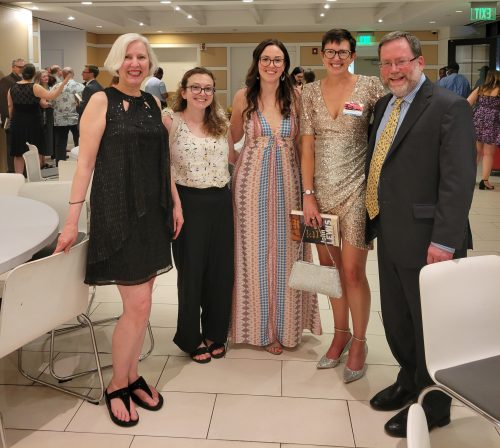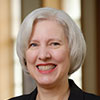Steve, Jeff, and I were the only people from ZSR Library at the ALA Annual Conference this time. This was my first in-person Annual Conference since 2019. I attended because I was finishing a 3-year term on the Board of the Core Division of ALA and Core is celebrating 5 years of existing, having formed from the merger of the ALCTS, LITA, and LLAMA Divisions. A dressy gala event was de rigueur for Board members, and Steve attended too ,being the incoming President-Elect of Core. A colleague at Elon, the dynamic Shannon Tennant (with nametag), wanted a picture of all of the gala attendees from NC. I think it is cool that we, from ZSR, bookended the group in the photo.

ALA Annual Conference 2025, Philadelphia, Core Gala[/caption]
I was grateful that Jeff, as well as Steve, also attended the Core Awards and President’s Program, ensuring that I had smiling faces in the audience, since it was nerve-wracking to me to walk up onto the stage to receive a Presidential Citation (fortunately one of several, but we had to go up individually). These events and Board and Section meetings took up a large part of the conference, but I got to attend a few sessions.
At the opening General Session, Mr. James W. Lewis of Washington, D.C, originally from New Bern, NC, was greeted with thunderous applause when thanked in person for his generous multi-million dollar gift to ALA for scholarships. In that moment, I was one proud NC librarian. When he spoke briefly, he mentioned Wake Forest University as his alma mater. I gave a whoo-hoo and raised touchdown arms for each of those mentions — and I heard others out of the hundreds of people there whooping too. Whoo-hoo! Go Deacs! Pro bibliothecarii and Pro Humanitate! The mayor of Philadelphia was a great pump-up-the-crowd speaker ahead of the featured speaker, Governer Gretchen Whitmer of Michigan, but I loved that part with Mr. Lewis the best.
The authors of Generative AI and Libraries: Claiming Our Place in the Center of a Shared Future were optimistic and inspiring:
“…as the authors of this book persuasively argue, libraries are uniquely positioned to lead AI’s ethical and human-centered integration within communities. Blending theory and concepts with an unswervingly pragmatic approach, from this book readers will
- be introduced to foundational principles and frameworks for navigating the so-called “Age of Intelligence” that provide useful guiderails no matter how AI technology actively evolves;
- delve into the complex ethical considerations of AI, including bias, equity, privacy, misinformation, and the potential impact on human agency and dignity;
- explore AI literacy as an expression of metaliteracy using seven frames for instruction and learning;” [and more]
One of the authors also recommended _The Last Human Job: The Work of Connecting in a Disconnected World_ by Allison J. Pugh (IBSN: 9780691240817).
At the ACRL Artificial Intelligence (A.I.) Discussion Group, my table chose Student Learning from a list of several topics. We had 4 academic librarians and 1 public. I shared how we have been working on licensing tools (e.g. Scite.ai) and that I knew WFU faculty were making assignments using AI and the others shared similar stories. The public librarian was highly concerned about hallucinations and we told him about curated environments that some tools provide, including Notebook LM, which we have in WFU’s Google Enterprise environment. IS has been offering sessions to help set up an account and learn to use it.
I attended the NISO Update Forum:
- KBART phase III (hope to release in Q4 2025): Improvements and simplifications to handling journal holdings (gaps and other odd situations); media with a 2 tiered approach of “compliance” (new label) to encourage adoption; new licensing language; road map for new format options (JSON, XML) in addition to existing delimited text, which creates flexibility for KBART automation. Coming soon: KBART data validator; new public news group. Being released for public comment very soon! Please give feedback.
- Open Discovery Initiative (ODI): Vendors, content providers and librarians need to work together. Fair linking (not biz based and biased) libraries choose what platform to link to. White paper to be released soon on Generative AI survey to learn hopes of people.
- Transfer Project: Transfer “compliant” publisher is good, but “endorsing” is better because those publishers also use the transfer alerting service (TAS) which gives public notice of the changes. Vendor neutral platform with multiple communication preference options (including email, RSS). The landing page on the web for the TAS gives info on which or if both publishers proving the perpetual content access.Version 5 of the Transfer Code of Practice has completed the comment period in 2025. V.5 expanded for Open Access content.
- Use the Peer Review Terminology standard (see peerreviewterminology.niso.org) with faculty and students!
At ACRL Trends and Statistics, I learned about their Benchmark tool. Data entry is free but to see other data or produce reports, you have to subscribe: $630 annual or $3150 for consortium. The amount is for cost recovery plus future development. As with any stats, there are a variety of caveats (and a lot depends on who gives their data). I note that we turn in ACRL stats to ASERL and we get to see our fellow ASERL institution stats in a complete report, so unless we needed data from institutions outside of that group, I don’t see how this would be worth the expense. (An interesting tidbit: one graph in the demo showed libraries in the speaker’s limited peer group as keeping close to 80% expenditures per year on recurring costs consistently for about a decade. This has been a benchmark for most of my multi-decade career and I was interested to see it on the screen even with the changes in how liaisons are purchasing books and the rise of e-resources over the physical.)
The vendors I spoke with on the exhibits floor were very happy to hear we had a flat collection budget rather than a cut. “Flat is good!” was a refrain. It was good to reconnect with some I had not seen since 2019, and to meet our new sales rep for Amalivre.
I was fortunate to get rebooked at the last minute onto the flight that Steve and Jeff had coming home, which left about 4 hours late due to horrendous thunderstorms. My new suitcase, purchased at a close-by TJ Maxx in Philadelphia (since mine lost a wheel) spent an extra night in Philadelphia, but I didn’t!

4 Comments on ‘Lauren C. at ALA Annual 2025, Philadelphia’
Thank you for sharing Lauren. It sounds like a wonderful conference. The James W. Lewis scholarship is such a wonderful initiative!
Congratulations on receiving Presidential Citation from Core, Lauren! A well-deserved honor. Also, thank you for sharing your takeaways from the conference. So many great updates!
Dang, y’all clean up good!
Congrats on the citation, Lauren!
Congratulations on the citation, Lauren! I wish I could have been there to cheer you on! It sounds like a great ALA, and it’s great to see ZSR continue to be so engaged with Core!